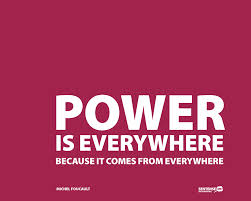Following answer has been evaluated by Subhra Ranjan Ma’am and awarded 13 marks out of 20!

Ans.Post-modernism is an intellectual tradition that is based on the belief that truth is always contested and plural. it emphasizes that all ideas and concepts are expressed in language which itself is enmeshed in complex relations of power. Influenced particularly by the writings of Foucalt, the post-modernists have drawn attention to the link between power and systems of thought using the idea of discourse or ‘discourses of power’. This implies that knowledge is power.
Foucault radically reconceptualized the notion of power. According to him, power is not repressive i.e. in the modern era, power does not operate by preventing us from doing what we want. Rather, Foucault sees power as productive-power produces identity and subjectivity. Further, power does not emanate from a single source, whether the state or the ruling classes. Power is conceptualized by Foucault as capillary-flowing throughout the system like blood in the capillaries of our body. The identities produced by power are ways of controlling through naming, and this control is exercised in a variety of locations, in our everyday lives.
Through the mechanisms of ‘governability’, we are produced as the subjects of governance. Governability refers to the increasing homogenisation and organisation of society in modern times through a huge bureaucratic machinery that involves endless ways of classifying people. It also operates through normalisation by which Foucault means the pocesses through which every individual is made to conform to the dominant norm.
Foucault holds that knowledge is a function of power relations-knowledge is produced and gained in order to be put to certain use, in order to achieve power. Power produces knowledge. Power is not a thing or substance, it is not embodies in an institution or a group of people-power is exercised as a technique. The only way it can be identified is when it is exercised by some people over others. An important indication of the existence of power is a display of resistance to it.
Foucault draws upon an anti-Enlightenment tradition that rejects the equation of reason, emancipation and progress. He argues that an interface between modern forms of power and knowledge has served to create new forms of domination. The modern forms of knowledge and rationality are, in fact contingent socio-historical constructs of power and domination.
Foucault concentrates on the domination of the individual through social institutions, discourses and practices.